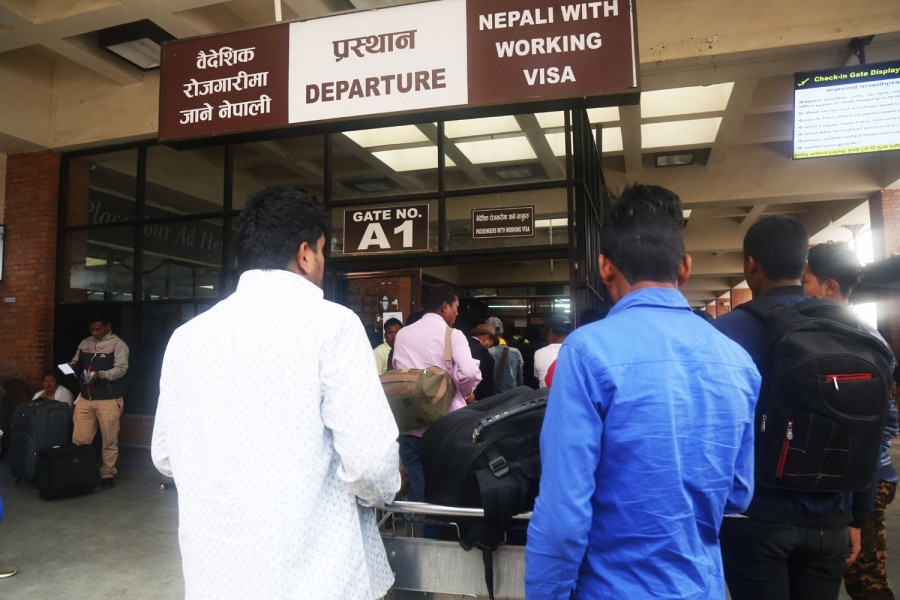National
Workers preparing to go abroad to get updated training from this week
The new curriculum aims to provide migrant workers country-specific information and protect workers in destination countries.
Chandan Kumar Mandal
Nepali migrant workers will soon have to sit for orientation training before they head to their destination countries.
The Foreign Employment Board, which is responsible for overseeing the overall training, aims to implement the new module, part of the updated curriculum, from this week.
Rajan Prasad Shrestha, executive director at the board, said his office will implement the new curriculum from Falgun 1 [February 13].
“The new curriculum has already been approved and is ready to be implemented. Over the next few days, we will conduct orientation for trainers,” Shrestha told the Post. “Once the trainers’ orientation is completed and they receive the training materials, the new curriculum will be implemented.”
An update to the pre-departure orientation training programme had been long overdue—the current curriculum was designed seven years ago.
Under the new curriculum, the pre-departure training will go on for 12 hours—six hours each for two days. The previous module was 10 hours long.
According to Shrestha, the whole module has been divided into two sections: basics of foreign employment and its associated risks and country-specific knowledge.
The first section will impart information on the basics of foreign employment such as how to board flights, whom to contact when stranded at the airport, and how to minimise the risk of workplace accidents.
The second part, which imparts knowledge on destination countries, is the highlight of the updated curriculum. Earlier, all workers, irrespective of the country they were going to, would get the same information on local culture, language, traditions and traffic rules, among others.
“Even if all prospective workers learn about labour migration in general, it’s not a good idea to teach everyone everything about countries they are not going to,” said Shrestha. “Malaysia-bound workers should learn about the language, culture, rules and regulations of Malaysia, not other countries.”
The second part of the curriculum will also make aspiring migrant workers aware of rules and regulations of destination countries, its labour laws, facilities and services they are entitled to, and activities barred on foreign soils.
Labour migration experts have welcomed the new changes, especially the provisions related to the dissemination of country-targeted information.
“Even in the Gulf region, not all countries have similar rules,” said Swarna Kumar Jha, a labour migration expert. “For instance, rules are stricter in Saudi Arabia than other neighbouring countries. Therefore, providing country-specific information is crucial.”
The new curriculum has also put more weight on the audio-visual medium of training than mass lectures.
According to Shrestha, 60 percent of the training is to be conducted through the audio-visual medium.
The board has produced all education and communication materials as well as audio-visual materials to be distributed to trainers.
“Once the trainers’ orientation is completed, we will create a pool of trainers and an online group where the board will upload all training materials,” said Shrestha.
Currently, 160 private pre-departure training providers have been registered with the Department of Foreign Employment.
The implementation of the new curriculum, however, is not going to be an easy task given the malpractices prevalent in the labour migration sector.
In the past, pre-departure orientation training providers have also been accused of colluding with recruiting agencies to issue fake certificates to migrant workers without them attending the training. Likewise, trainers have been questioned for their lack of first-hand information on destination countries as they have never visited the countries.
“Imparting training through audio-visual materials and extending training duration are encouraging. Migrant workers can certainly learn better through pictorial displays and animations,” said Jha. “But workers must be present to attend the training. All stakeholders must ensure that workers attend the whole training.”
Jha points out that the foreign employment department, foreign employment board as well as training providers need to do their bit to effectively implement the new curriculum.
“We have all the policies, but often people find loopholes,” said Jha. “All stakeholders should act responsibly if they really want to enforce the curriculum to help migrant workers.”
In a bid to tackle this issue, officials say they have also designed an online monitoring system so that the training takes place as per the curriculum.
“Once all the training for trainers is completed, the board will supervise the trainers. We can contact them anytime,” said Shrestha. “Also, when the details of the batch of candidates are uploaded on the government system, the call centre can also contact the trainers at the classroom and monitor the training live.”
Besides, CCTV cameras will be installed at the institutions conducting pre-departure orientation training. The board is also developing a separate mobile app to help migrant workers learn the language of the country they plan to work in.
“We are developing the app since the two-day orientation training is not enough for teaching the local language to aspiring migrant workers,” said Shrestha. “It will be made mandatory for all workers to download the free app during the orientation training so that they can at least understand some basic words of the country they’ll be working in.”




 22.9°C Kathmandu
22.9°C Kathmandu














